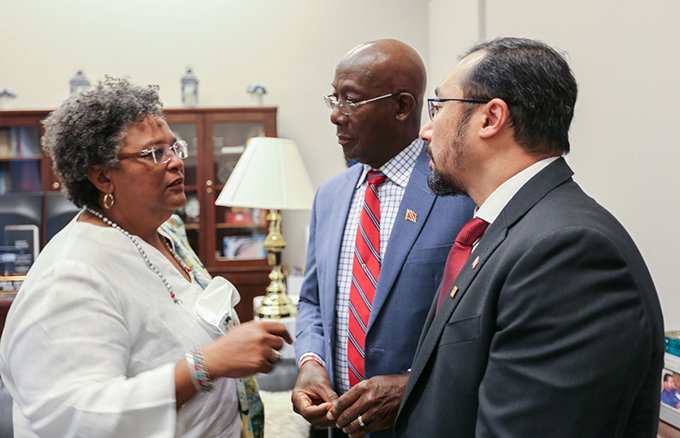(Trinidad Guardian) Prime Minister of Barbados Mia Mottley has said almost every country in the region over the course of the last decade, with the exception of two or three, has had a loss of more than 30 per cent of their correspondent banking relationships.
Mottley made the remarks as she outlined how the Caribbean has been grappling to cope when large foreign financial institutions scale back or end relationships with regional banks which in turn, make it significantly more difficult to do business and obtain financial services, resulting in deep and broad consequences, ranging from higher business costs, lower economic activity and arrested development.
The Barbadian PM testified in Washington on Wednesday on the impact of de-risking in the Caribbean before Congresswoman Maxine Waters, Chairman of the House Committee on Financial Services during a full hearing titled, “When Banks Leave: The Impacts of De-Risking on the Caribbean and Strategies for Ensuring Financial Access.”
The hearing stemmed from a roundtable discussion on De-Risking held in Barbados in April this year, which brought together Caribbean leaders, other regional high-level officials and US representatives led Waters.
In outlining the difficulties which also impact ordinary citizens Mottley said, “When we were growing up, opening a bank account was a part of our rites of passage and becoming an adult. Today, it is a gargantuan obstacle for us to have our people do so.”
Mottley also added Caribbean economies cannot function on their own as they do not make enough clothes, do not produce their own food or even their own equipment.
“We are here because we’re fighting for global public good. We’re fighting for the human rights of our citizens,” she said.
Correspondent banks, Mottley said, are leaving these jurisdictions because the Financial Action Task Force (FATF) has listed them as countries requiring increased monitoring against money laundering. She explained this is not because they have found any material international money laundering there but additional monitoring causes, additional costs, primarily fixed per jurisdiction and so disproportionately higher per transaction in small jurisdictions.
The Barbadian PM also warned that unless the region is able to trade with the rest of the world, it is at risk of becoming “financial pariahs.” “We are here because the listing process that has taken place, whether through the Financial Action Task Force or the OECD, or further as a result of actions taken for enhanced due diligence by those who take the listings from the FATF and the OECD.
“It means those correspondent banks over the course of the last 10 to 12 years, have made a judgement that we are simply too small as I’ve just told you in order to get involved because the enhanced due diligence means increased costs of regulation, increased cost of compliance. And rather than do business with us, they say thank you, but no, thank you,” Mottley further explained.
She also expressed concern that the fear of losing correspondent relationships has created a highly risk-averse culture, worsening these impacts and causing a decline in financial inclusion.
It will force legitimate transactions underground, giving life to unregulated international payment systems that will create a national security problem, Mottley said.
“What we face is a situation that the very thing that you set out to achieve, which is the avoidance of terrorism financing, the avoidance of money laundering on which we are all agreed, is likely to happen because you’re driving people underground.
“There is no benefit in driving our citizens underground or making our countries uncompetitive, such that our economies are at risk of becoming underdeveloped or failed states,” Mottley said.
She said for almost a decade the region has been “making noise” which cannot continue.
Mottley advised that financial institutions in Caribbean therefore, need ready and constant access to services to enable them to facilitate cross-border trade and investment and to assist governments to address the economic challenges.

